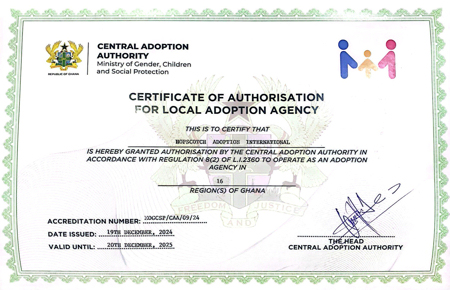Adoption from Ghana
Adopting from Ghana
Hopscotch’s program in Ghana has helped approximately 41 families adopt 51 children to the US since its inception in September 2008.
While Hopscotch’s Ghana program remains active and vital, unexpected delays and changes to the process may occur, sometimes without notice, and families should remain open to such as they move through their adoption journeys. Having the right partner on the ground that successfully navigates the ever-changing landscape is paramount to a family’s success. Hopscotch’s Ghanaian partner is highly respected with both the US embassy in Accra, Ghana’s Central Adoption Authority (the Department of Social Development Ministry of Gender, Children, and Social Protection), family courts in all regions and among program officers for International Organization for Migration (IOM).
The Children
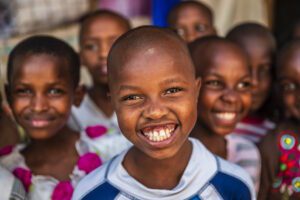
The children eligible for international adoption from Ghana are generally aged 2.5 years old and up. Siblings and older children are also in need of forever families. This is not an appropriate program for families who are only open to adopting an infant.
Families interested in adopting children with special medical and/or developmental needs are encouraged to contact us to discuss specifics.
Children eligible for international adoption from Ghana have often experienced adverse childhood circumstances that can result in developmental trauma and c-PTSD. Children with HIV, Hepatitis and Sickle-cell anemia also very much need families. Malaria and parasites are common and children must be tested and treated upon return home with their new family. Given the limited medical care and resources, children may come to the US without complete or accurate medical or social histories. To the extent Hopscotch is able to obtain additional information, we will do our best. We ask that each family considering international adoption and adoption from Ghana specifically be aware and set expectations accordingly, in regard to the accessibility and accuracy of children’s information they may or may not receive.
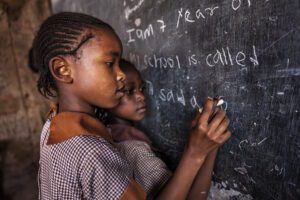
Eligible Applicants
Married heterosexual couples may adopt from Ghana. The country does not permit adoption by single parents with the exception of single women who hold dual Ghanaian and US citizenship. Single men may be approved case by case only when adopting a child that is a close relative. Parents must be between the ages of 25 and 55 and at least 21 years older than the child/children they wish to adopt. In kinship cases only, the prospective adoptive parents may be between 25 and 65 years of age. Applicants must be medically and financially fit to raise a child.
Program and Process
After a family has contracted with Hopscotch and completed their home study with a Hague-accredited agency in their state of residence, they must apply to United States Citizenship and Immigration Services (USCIS) for approval to bring an orphan into the United States. Ghana is a Hague Convention Country and therefore, a family will file the I-800A. Families often create the dossier for Ghana during the home study phase since many required home study documents can be completed or obtained simultaneously for both the home study and the dossier.
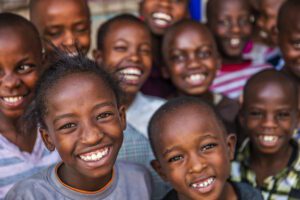
Once the family has received USCIS approval and has completed the dossier, Hopscotch will review and ship the dossier to our in-country partner to register the family with the Ministry of Gender, Children, and Social Protection in Accra. Once the dossier is registered, the family’s referral wait begins. Hopscotch is a child placing agency and our focus and responsibility are in finding families for children. We do not find children for families. This is a very important concept to remember, especially when the wait for a referral is unpredictable as is the case with Ghana. Once a referral is presented to a family, a brief medical and social report will be provided although the scope and reliability of the shared social background will be limited by the restrictive cultural approach to and interpretation of such information.
Upon receipt of a referral, the family will travel to Ghana to meet the child referred to them. If moving forward with the adoption after meeting, Hopscotch will assist the family in filing their I-800 with USCIS. After receipt of the I-800 approval, the family must return to Ghana for a required bonding period. The Department of Social Welfare in the Region where the child resides supervises the pre-adoption placement of the child for three months one month of which the physical presence of the prospective adoptive parents with the child is mandatory after which a post placement report is prepared. At the conclusion of the bonding period, the family will apply to the regional high court to receive an Adoption Order. The timeframe for the court process varies.
When the court has issued the Adoption Order, families will apply for a new birth certificate and for a Ghanaian passport for the child as well as receive a Certificate of Conformity from the Central Adoption Authority. The final step in the process will be the child’s US visa medical exam and in-person visa interview at the US embassy in Accra. Our partners in Ghana will assist families in scheduling these appointments.
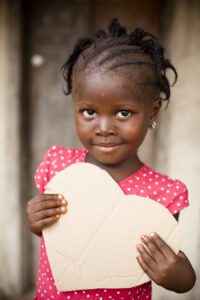
When the court has issued the adoption decree, the final step in the process will be the child’s US visa medical exam and in-person interview at the US embassy in Accra. Our partner in Ghana will assist families in scheduling these appointments.
After the visa interview, the consular officer will adjudicate the case and a family can likely proceed with picking up their child’s US entry visa within one week. With the child’s visa placed into his or her passport, the child may move to the US.
An adoption from Ghana can usually be completed in two trips but may necessitate three trips of varying length. Each case is unique and we ask families choosing this program to bring flexibility and patience to the process.
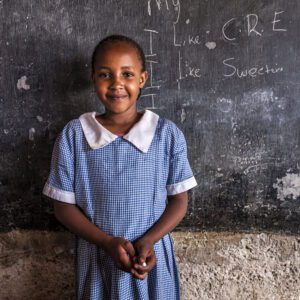
In-country hosting is organized on the family’s behalf and accommodations are with English speaking proprietors.
Following the children’s adoption and move to the US, their US Certificate of Citizenship will come by mail automatically unless the child is 14 years old and up in which case s/he must appear to take the citizenship oath in person.
Families will also have to comply with post-adoption reporting requirements set forth by their state of residence, Hopscotch and the Central Adoption Authority in Ghana.
Country Specific Post Placement and Post Adoption Report Schedule
Kinship Adoption
Hopscotch gladly assists families with the adoptions of eligible children related to them by birth or marriage. Families must understand that not every child will meet the USDOS definition of orphan and that we can only work with families who plan to adopt relative children who fulfill the criteria and have the proper documentation to support their eligibility. Please contact us to discuss the specific circumstances of your proposed kinship adoption, so we can advise further. Families undergoing a kinship adoption should plan on a single trip to Ghana to attend the court hearing, obtain the US visa(s) for the child/ren and then bring the child/ren to the US.
The Country
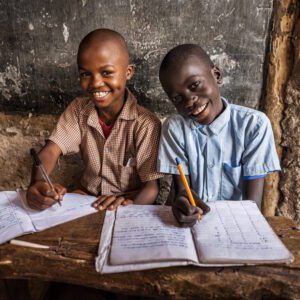 The ancient and historically significant country of Ghana is one of the five African nations along the northern coastline of the Gulf of Guinea. It is bordered on the west by Cote d’Ivoire, on the north by Burkina Faso, and on the east by Togo. The country consists mostly of low-lying savannah regions, with a central belt of forest.
The ancient and historically significant country of Ghana is one of the five African nations along the northern coastline of the Gulf of Guinea. It is bordered on the west by Cote d’Ivoire, on the north by Burkina Faso, and on the east by Togo. The country consists mostly of low-lying savannah regions, with a central belt of forest.
Ghana’s rich history centers on the once-great Ashanti Empire, which rose to power during the late 17th century and continued to prosper as a center of the 18th century slave trade. The Ashanti capital, Kumasi, was one of the finest and most advanced cities in Africa, and the Ashanti state even employed significant numbers of Europeans as advisors and administrators. The European presence in Ghana is also marked by the multitude of colonial forts that dot its coastline–strongholds that anchored the European trade in gold, ivory, and slaves. Although Ghana, then known as the Gold Coast, was largely considered a British territory by the latter half of the 19th century, it wasn’t until 1900 that the British succeeded in defeating the Ashanti and the area’s other strong kingdoms.
If Ghana was late in coming under European control, it was also the first African nation to win back its independence, in 1957. However, corruption and internal military strife proved to be apparently intractable problems, and Ghana went through an extended period of instability in the 1960s and 1970s marked by military rule. The country has since then been moving steadily toward political and economic stability and is currently one of the most peaceful nations in Africa. Unfortunately, Ghana’s economy is currently struggling and many of its people live in abject poverty.
Numerous Ghanaian children have been orphaned by the conditions that their families live under, with parents who are unable to feed or clothe their children.
As reported by the CDC, the top ten medical risks include, malaria, lower respiratory, infections, neonatal disorders, ischemic heart disease, stroke, HIV/AIDS, tuberculosis, diarrheal diseases, road injuries and diabetes. Life expectancy at birth is reported an average of 64 years for women and 62 years for men. The average income is reported to be $4,490.00 in USD.
Fees
Contact Hopscotch Adoptions, Inc to request a fee schedule at info@hopscotchadoptions.org
*In the unlikely event the adoption court issues an interim adoption decree, the family will be required to return to Ghana or if permitted, retain a Ghanaian attorney to appear on their behalf after a two year period to obtain a full and final adoption decree.
Recommended Reading
For Children
Why Am I Brown: A child’s view of multicultural adoption by Jacqueline Meissner
A Mother for Choco Keiko Kasza (also available as a board book)
Is That Your Sister? by Catherine and Sherry Bunin
The Skin I’m In: A First Look at Racism by Pat Thomas and Lesley Harker
General
Family Dynamics and Culture of Ghana (PDF)
Culture Keeping: White Mothers, International Adoption, and the Legacy of Cultural Differences by Jacobson
Weaving a Family: Untangling Race and Adoption by Rothman
There is no Me Without You by Melissa Fay Greene (the story of an Ethiopian woman helping orphans)
Loving Across the Color Line: A White Adoptive Mother Learns about Race by Sharon E. Rush
Beyond Good Intentions by Cheri Register
Cross-Cultural Adoption by Amy Coughlin and Caryn Abramowitz (quick and easy, good for relatives)
Inside Transracial Adoption by Gail Steinberg and Beth Hall
I’m Chocolate, You’re Vanilla: Raising Healthy Black and Biracial Children in a Race-Conscious World by Marguerite White
In their Own Voices: Transracial Adoptees Tell their Stories by Rita J. Simon and Rhonda M. Roorda
